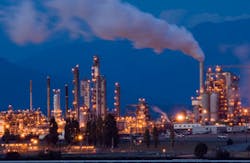Air quality concerns may delay petrochemical expansion in Texas, experts say
Projects for new petrochemical plants on the U.S. Gulf Coast worth billions of dollars may be delayed or even blocked as a result of a set of more stringent air quality regulations implemented in the Texas industrial region, Energy Wire reported.
Companies in the area have already been burdened by tight ozone and other hazardous plant emissions and are struggling to comply with them. Experts believe that these restrictions might be an obstacle for upcoming ethane crackers, planned to utilize the growing shale gas production.
Many experts have been predicting that the increase in shale gas production would lead to a sharp rise in petrochemicals production and exports. To facilitate all this, thousands of miles of pipeline are under construction and plans for dozens of new petrochemical plants in Louisiana and Texas are awaiting approval.
However, some of these facilities may never see the light of day or their plans may have to be reviewed dramatically because of the serious restrictions imposed by emission regulations. According to Mark Chung, manager of natural gas liquids analytics at BENTEK Energy, these limitations may have an adverse effect on the expansion of the U.S. petrochemical sector. This is just a speculation but it may turn into a huge risk for the industry, he added.
The air emissions limits are administered by Texas lawmakers under the Clean Air Act and apply to facilities that use high temperatures and pressure to crack ethane, propane and other gas liquids into ethylene and other products that serve as feedstock to manufacture various types of plastics. During the process of cracking liquids, the plants' furnaces release particulate matter, ozone precursors, carbon monoxide and different volatile organic chemicals. All of these are subject to the Clean Air Act and are regulated through strict air quality controls, Energy Wire said.
RELATED: Shell to invest $115 million to reduce air pollution around Houston
Companies operating in Texas have caps on emissions and if they want to add a cracker to their existing petrochemical plant, they will have to reduce emissions from other processes and make room for emissions from the cracker. If they cannot do that, they can buy emission reduction credits from other companies that have not used theirs to make sure they do not exceed the allowed amounts of emissions.
Just like any other product on the market, demand and supply for these credits are tightly interwoven. As production grows, demand for emission reduction credits has skyrocketed and, as a result, prices have also leaped, commented Randall Lack, chief marketing officer at environmental commodities company Element Markets LLC. As plans for petrochemical facilities continue to pile up in the Houston area, most of the available emission reduction credits have been sold out, with prices for volatile organic compounds credits reaching $300,000 per ton, up from several thousand dollars a ton. This is likely to become a major setback for petrochemical projects in the Gulf of Mexico, he claimed.


